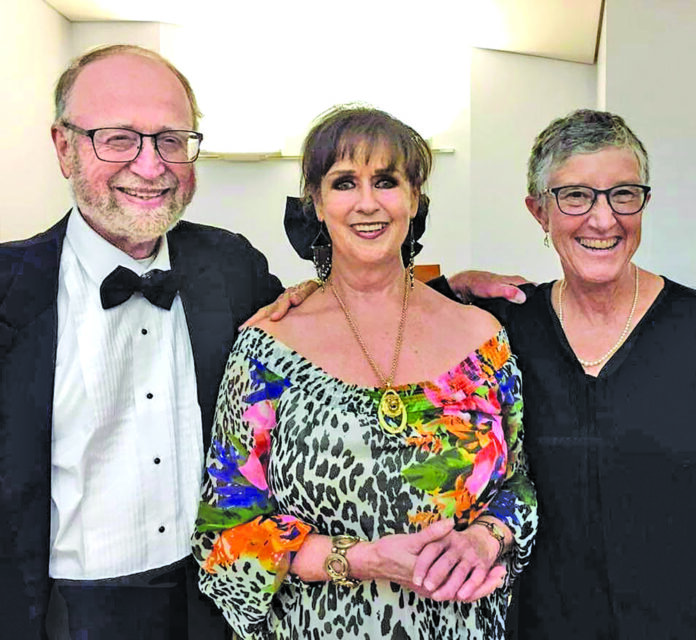
This is the first of a 4-part series on the career, the plans and thoughts of Mary Lou Basaraba, who is the musical director at Grace Lutheran Church and Temple Akiba, both in Culver City.
Professionally, she goes by the name Marya Basaraba.
The conversation took place through an email exchange.
Tell us about your most rewarding accomplishment.
MLB: In my younger days, I think I would have said that juggling my broadcast career and acting and musical performance life was incredibly rewarding.
I have been so lucky to have had many incredible professional experiences of all sorts, but I think my most rewarding accomplishments now are to
perform with my students and to see them move on to their university, conservatory and professional careers either as coaches in their own right or on the concert stage.
What are the differences in performing as a musician vs. a music director?
MLB: These roles present very different responsibilities.
For a singer, it is always LA VOCE, THE VOICE and breath that define daily and social life.
For a pianist or other instrumentalist, protecting the hands and face define your every day and recreational activities.
A director is responsible for facilitating others to do their best, finding the path to getting the best performance possible from others, acting as a mentor, often in a surrogate parental role. The focus is not on your best public effort, but that of your singers, actors and musicians.
What are the differences between performing live vs. in front of a camera?
MLB: Depending on the venue and performance vehicle; live theater, opera, symphonic concert with other soloists or not, a company of actors, singers, dancers, a live show might necessitate competent stagecraft, excellent vocal projection or not if there is a full sound system with a great engineer.
There are so many variables in a live situation that a professional artist should be familiar with.
Performing for a camera is totally different. The camera is focused on the actor or singer who may or may not be doing a close up to an actual partner.
I remember working with an actor who would just as soon have delivered his lines to the coffee pot with a mark on it as to my face!
With a good director, that can actually work but, it is certainly a different way to connecting with the other performer in a manufactured situation other than real interaction and relationship.
Are great musicians born with a gift? In successful artists, what percentage is natural talent and what percentage is training?
MLB: People are usually born with some innate ability and with a passionate desire to develop that, they might just become a great musician.
Musical talents or natural gifts are not learned, they are inherited or born to the individual. A natural voice or interest in an instrument, good ear, the ability to imitate, to mimic something inspiring, good rhythm, intelligence, enthusiasm, curiosity.
These can all be developed by music education, lessons, great instructors from an early age, family and community support, superhuman discipline and a desire to become their own best.
At every stage, the top young musicians and singers, like the upper echelons of athletes, meet their peers, the others who are the top of the class, the big fish in their respective pond.
I have been very lucky to have had several such young students who have entered the relative ‘Olympics of Singing’, the best young singers in their community, even in the country competing at the highest level.
They have attended competitions and workshops across the country and with the LA Opera, the Washington National Opera, Aspen Music Festival and others, performed on the stages of the Kennedy Center and the Walt Disney Concert Hall and, gone on to Scholarship study at USC, UCLA, Chapman, Yale and the Boston, San Francisco and Oberlin Conservatories.
Once they get to a certain point, they leave the love and passion of their Art and enter the business of it. That is a huge shift and often defeats even the most ‘talented’, competent or ambitious. I had an exceptional coach at one point who said the performer is lucky to be on top of their inspiration, enthusiasm, commitment and joy about 20% of the time.
The rest of the time, it’s all about technique and giving the audience the impression that they are on top of all of those elements.
It’s hard to make that transition to being For Sale, a commodity and to still maintain the joy!
I was also blessed with the gift of sight reading both at the piano and as a vocalist, being able to play most piano scores at sight without the burden of insane hours of practicing.
Once upon a time, I did practice a lot to play difficult works by the classic composers but in more recent years with my assignments at Grace Church and Temple Akiba I have had to re educate myself to play from lead sheets and to make sense of praise and popular styles of music.
This was not an innate ability so, I actually had to figure it out, a new experience!
